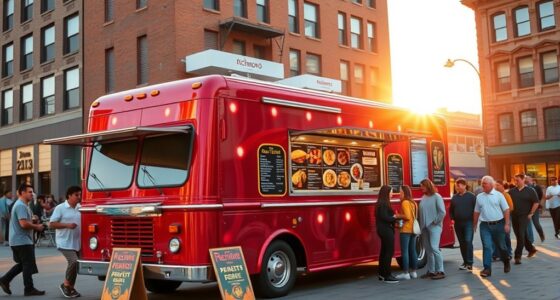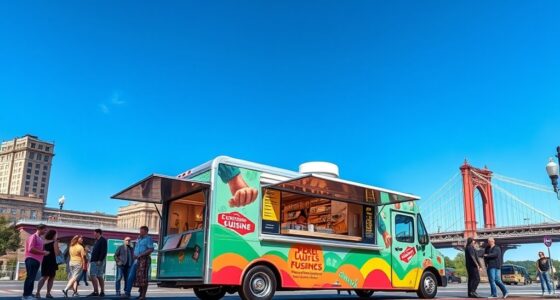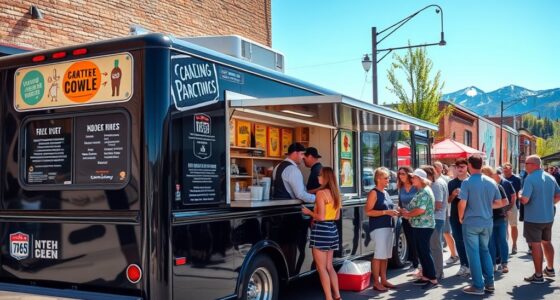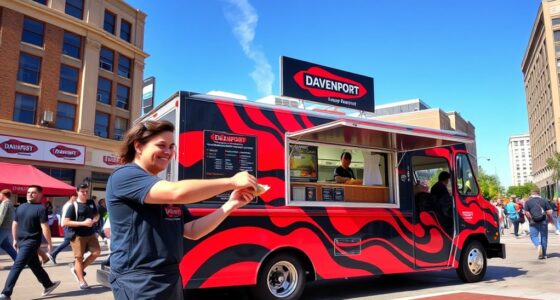To open a food truck in Idaho Falls, you need to secure permits from the local health department, city, and fire safety, which involves application fees and inspections. Budget for costs like vehicle expenses, licensing, and permits, then choose busy, compliant locations to maximize sales. Develop a safe, appealing menu focusing on quality and variety, and create engaging marketing strategies with signage and social media. Keep exploring the details for a successful launch and sustained operation.
Key Takeaways
- Obtain Idaho Falls Mobile Food Establishment License and local permits, including health, fire safety, and itinerant merchant licenses, with a review process of around 30 days.
- Budget for permit fees ($75–$100 annually), vehicle costs, equipment, insurance, and ongoing operational expenses to ensure financial viability.
- Choose high-traffic, compliant locations such as public streets, parks, or special event sites, respecting zoning laws and parking restrictions.
- Develop a diverse, safety-compliant menu featuring high-quality, culturally inspired, and health-conscious options to attract a broad customer base.
- Implement effective marketing strategies using signage, social media, branding, and community engagement to build visibility and customer loyalty.
Navigating Permits and Licensing Procedures in Idaho Falls
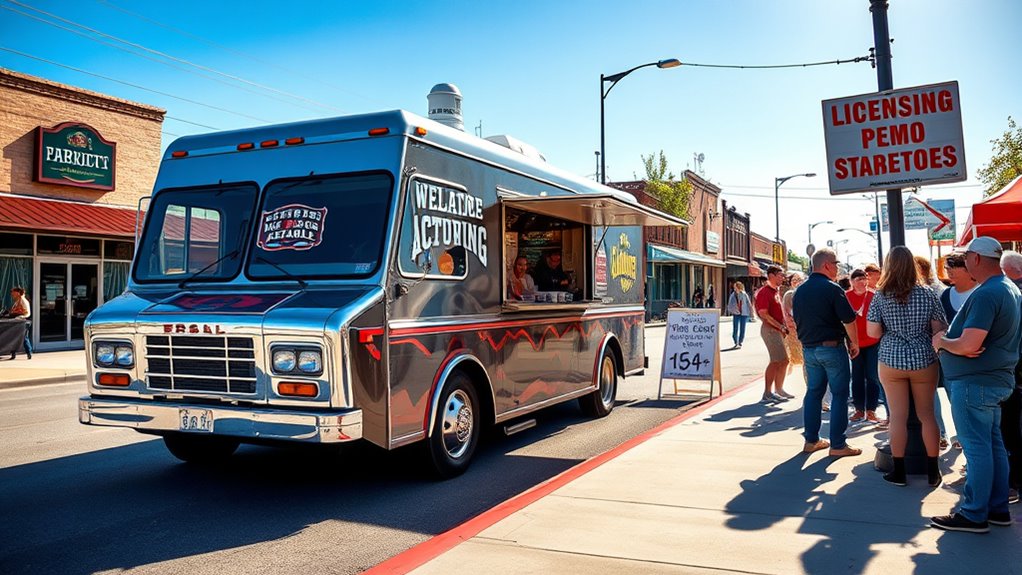
Navigating permits and licensing procedures in Idaho Falls can seem complex, but understanding the key steps makes the process manageable. First, you need to submit your application at least 30 days before opening or changing ownership. Your application must include a mobile food establishment license form, a floor plan, menu, operational plan, and commissary agreement if applicable. Fees vary: $80 without a commissary, $100 with one, plus a $100 plan review fee. A pre-operation inspection by the health department is required before getting your license. The license is valid statewide for one year, with the same menu. Additionally, you’ll need an itinerant merchant license from the city clerk, including details like your food offerings, tax ID, and vehicle info. The city reviews applications within 30 days; denials can be appealed. Understanding local regulations is crucial to ensure compliance and a smooth approval process. Moreover, being aware of state-specific licensing requirements can help prevent delays or issues during your application process.
Understanding Costs and Fees for Mobile Food Businesses
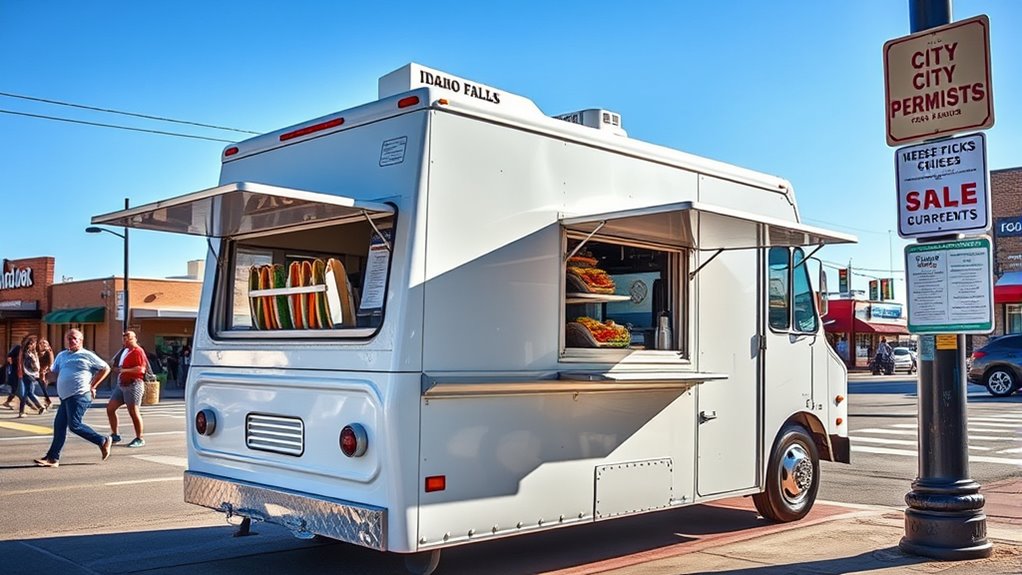
Understanding the costs and fees for your food truck is essential for staying on budget and ensuring profitability. You’ll need to contemplate licensing fee structures, additional permit expenses, and how to plan your finances effectively. Let’s explore how to estimate these costs and develop a solid budget strategy for your Idaho Falls mobile food business. Being aware of forsale 100 options can also help you manage startup costs efficiently.
Licensing Fee Structures
Licensing fee structures for mobile food businesses vary widely depending on the city, state, and the scope of your operation. In Idaho Falls, the annual city license costs $75, with options for $80 without a commissary or $100 with one. If you have multiple units, each additional mobile unit is $80. Temporary licenses range from $35 for a single day to $80 for several days. Plan review and inspection fees are $100, while license reinstatement costs $18. Late fees start at $35, doubling after 15 days. Statewide, Idaho charges $80 for mobile establishments without a commissary and $100 with one. Other cities, like Idaho City, charge $200 annually, with daily vendor permits around $16.50. Nationwide, costs vary from $200 to over $1,000, depending on local regulations. Additionally, understanding Gold IRA options can be beneficial for diversifying your investment portfolio, especially if you’re planning for long-term financial stability.
Additional Permit Expenses
When operating a mobile food business, you need to account for various additional permit expenses beyond your basic licensing fees. These costs include fees for commissary agreements, plan reviews, inspections, special event permits, and safety licenses. For example, using a commissary can increase your license fees from around $80 to $100 or more, especially if an unlicensed commissary is involved. You’ll also face costs for plan review ($100), pre-opening inspections, and possible follow-up visits. Operating at special events or on street permits adds daily or monthly fees. Fire safety permits, like operational or life safety licenses, can cost between $70 and $125. Budget for these expenses to avoid surprises and keep your mobile food operation compliant.
| Expense Type | Typical Cost |
|---|---|
| Commissary Fees | $80 – $100+ |
| Plan Review | $100 |
| Inspection Fees | Varies |
| Special Event Permits | $50+ daily |
| Fire Safety Permits | $70 – $125 |
Budget Planning Strategies
Planning your budget carefully is key to launching and maintaining a successful mobile food business. You’ll need to account for vehicle costs, which range from $40,000 to $150,000, or consider renting to lower initial expenses. Kitchen equipment must meet health standards, adding to startup costs, along with inventory expenses around $2,300 to $3,300. Ongoing costs like fuel, maintenance ($500–$1,000/month), and permits (typically $80–$100 plus review fees) are essential to factor in. Insurance—covering liability, vehicle, and possibly workers’ comp—adds to your budget but is crucial. Separate fixed costs from variable expenses in your plan, and keep a contingency fund for unexpected costs. Regularly tracking expenses and revenue helps you adjust and stay profitable as your business grows. Paying attention to costs and fees can help you better manage your overall budget and ensure long-term success.
Choosing the Right Location and Zoning Compliance
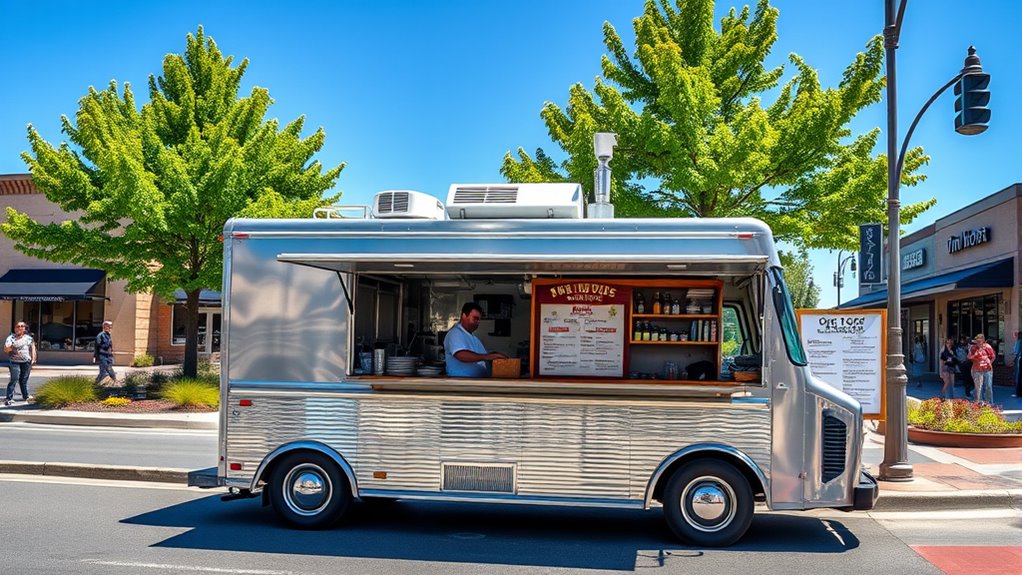
Choosing the right location for your food truck in Idaho Falls requires careful attention to zoning laws and restrictions. You must guarantee your spot complies with local ordinances to avoid fines or license issues. Keep in mind:
- Temporary occupation of land is limited to one year without extension.
- Commercial vehicle storage isn’t allowed in residential zones.
- Mobile vendors must operate on public streets, not sidewalks.
- Parks require a franchise contract, prohibiting casual vending.
- Trash and waste must be removed within 100 feet of your location.
- Staying informed about emerging technologies, such as digital payment systems and online marketing tools, can enhance your operational efficiency and customer reach.
Research specific zoning districts to find suitable areas that permit mobile food vendors. Verify setbacks and land use restrictions to avoid conflicts with structures or residential zones. Securing proper permits early helps maintain compliance and allows flexibility to adapt locations if needed.
Crafting a Safe and Appealing Menu
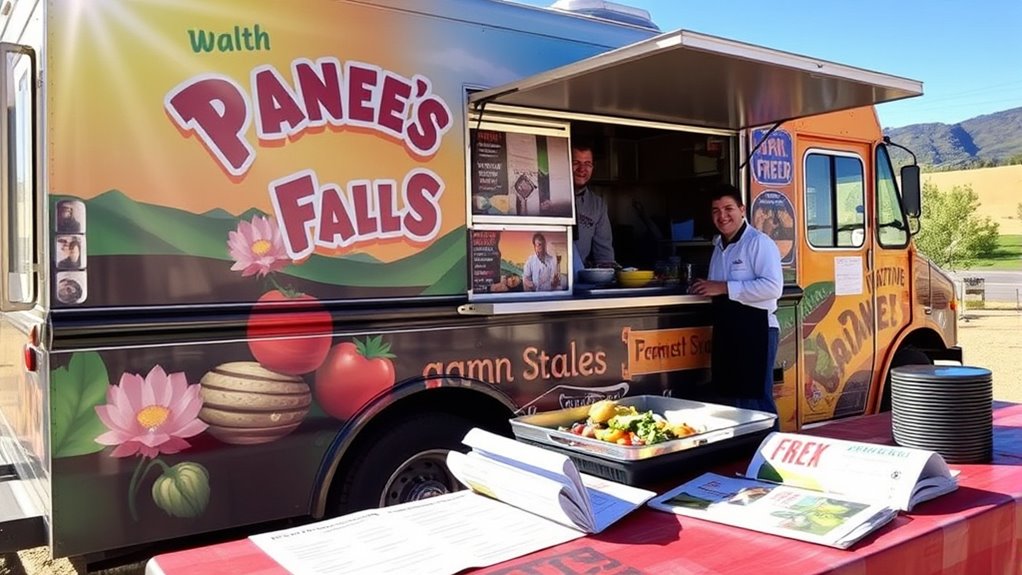
Creating a safe and appealing menu starts with following strict food safety standards to protect your customers. Focus on offering creative dishes that are easy to prepare and handle within your truck’s equipment limits. By emphasizing quality and safety, you’ll build trust and attract more repeat visitors. Incorporating proper hygiene practices is essential to maintain a clean environment and ensure customer safety at all times.
Food Safety Standards
Ensuring food safety is essential when crafting a menu for your Idaho Falls food truck, as it directly impacts customer health and satisfaction. To meet standards, you must follow strict hygiene and contamination prevention practices. Key measures include:
- Employees wearing clean outer garments and maintaining personal cleanliness.
- Regular handwashing, especially after eating, smoking, or handling garbage.
- Using utensils like gloves or tongs instead of bare hands on ready-to-eat foods.
- Sourcing food strictly from approved commercial facilities, avoiding home-prepared items.
- Storing food on non-absorbent, elevated surfaces and maintaining proper temperature controls.
- Implementing food safety standards that emphasize continuous staff training and monitoring to prevent contamination.
Adhering to these standards minimizes contamination risks, guarantees compliance with regulations, and builds customer trust. Proper sanitation of your vehicle and equipment is also crucial for maintaining a safe environment.
Creative Menu Offerings
Designing a menu that’s both safe and appealing requires thoughtful ingredient selection and presentation. Incorporate diverse concepts like plant-based burgers, sushi, falafels, or funnel cakes to set your truck apart. Focus on authentic, immigrant-led recipes that create meaningful cultural connections, appealing to customers seeking genuine flavors. Include health-conscious options like keto, gluten-free, or vegan dishes to attract nearly half of U.S. consumers prioritizing wellness. Use plant-based proteins such as Impossible or Beyond Meat to reduce your carbon footprint and expand options for eco-conscious diners. Creative storytelling about ingredient origins and menu items enhances trust and engagement. Seasonal specials and limited-time offers keep your menu fresh and exciting, boosting mobile sales and customer loyalty. Balancing innovation with safety ensures your menu is both appealing and reliable. Hamburgers are a popular and easily customizable option that can be adapted to various dietary preferences, making them a versatile addition to your menu. Incorporating infused butter or oils can elevate dishes with rich flavors and unique culinary twists, appealing to adventurous eaters.
Effective Marketing and Signage Strategies
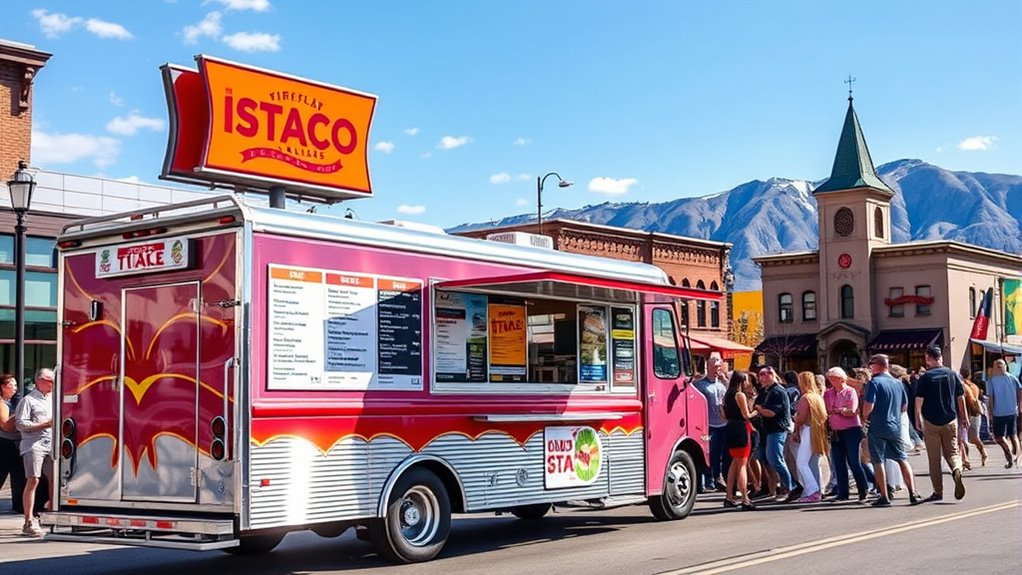
Effective marketing and signage strategies are essential for standing out in Idaho Falls’ competitive food scene. Your branding should be consistent across all platforms, with a memorable logo, color scheme, and messaging that reflect your truck’s personality—quirky, rustic, or sophisticated. Use eye-catching signage on your truck, like digital or chalkboards, to highlight daily specials and promotions. Incorporate your brand identity into social media by sharing stories about your journey and food inspiration, creating a stronger emotional connection. Engage your audience with:
- Regular social media updates featuring food photos and location hints
- Real-time location posts and event announcements
- Contests and polls to boost follower interaction
- Email newsletters for promotions and new menu items
- Printed flyers and posters at local hotspots to attract foot traffic
Over 40% of food truck consumers are under age 45, so tailoring your marketing efforts to appeal to a younger demographic can greatly enhance your visibility and customer engagement. Understanding the importance of branding consistency can help establish a recognizable and trustworthy image that resonates with your target audience.
Ensuring Operational Compliance and Best Practices
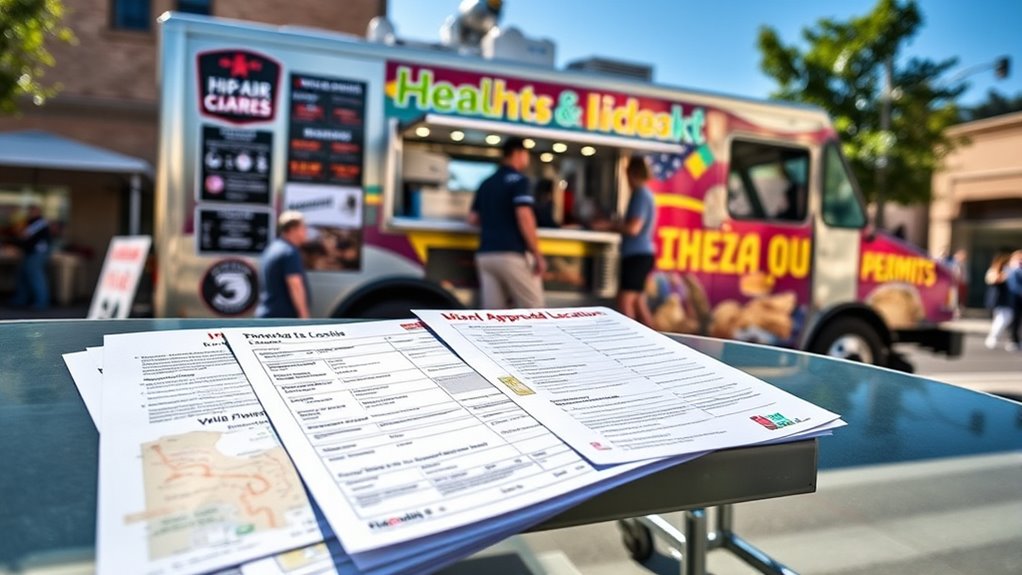
To operate your food truck legally and safely in Idaho Falls, you must adhere to all health, safety, and licensing regulations. Obtain approval from the Health Department, ensuring your truck meets Idaho’s food safety standards, including proper storage temperatures and sanitation procedures. Complete a Mobile Food Establishment License application with detailed plans and submit it at least 30 days before opening. Pass inspections by local fire authorities to get an approved vehicle sticker. Meet Idaho Food Code requirements for potable water and wastewater tanks, and provide suitable trash containers for customer use. Secure a business license, relevant permits, and register your vehicle as required by law. Follow zoning laws, parking restrictions, and operating hours to avoid violations, maintaining compliance throughout your business. Additionally, understanding food spoilage indicators can help ensure that all ingredients and supplies used in your truck are safe for consumption.
Frequently Asked Questions
Are There Specific Health and Safety Training Requirements for Food Truck Operators?
You need to complete food safety training before operating a food truck. Idaho doesn’t require statewide certification, but local health departments, including Idaho Falls, often mandate a Food Handler’s Card or a Food Protection Manager certificate. You should pass an accredited exam, like ServSafe, and keep your certification current. This guarantees you meet safety standards, avoid inspection delays, and stay compliant with health regulations, protecting both your business and customers.
Can I Operate a Food Truck Year-Round in Idaho Falls?
Think of your food truck like a boat steering Idaho Falls’ chilly waters year-round. You can operate all year if you stay compliant with permits, safety standards, and weatherproof your truck. Just like winterizing your boat, you’ll need to adapt—adding insulation, heating, and planning for seasonal customer flow. With the right preparations and ongoing permits, you can keep your culinary voyage sailing smoothly through all seasons.
What Insurance Coverage Is Recommended for Mobile Food Vendors?
You should get thorough insurance coverage to protect your mobile food business. Start with general liability insurance to cover injuries and property damage, and commercial auto insurance since your truck operates on public roads. If you have employees, you need workers’ compensation. Consider adding product liability for food issues, and if serving alcohol, liquor liability insurance. Customizing your coverage guarantees you’re protected against common risks and meets Idaho’s legal requirements.
Are There Restrictions on Selling Alcohol From a Food Truck in Idaho Falls?
You can’t sell alcohol directly from a food truck in Idaho Falls because current laws require a permanent physical location for alcohol licenses. If you want to serve alcohol, you’ll need to obtain a catering permit for specific events or operate within a licensed establishment. Keep in mind, you must follow zoning, safety, and signage rules, and coordinate with local authorities to ensure compliance.
How Do I Handle Waste Disposal and Recycling Legally and Sustainably?
Managing waste disposal and recycling can feel like a delicate dance, but you’re in control. You must use approved containers, keep waste leak-proof, and follow Idaho Falls sanitation codes. Separate recyclables from landfill waste, employ biodegradable materials, and partner with licensed waste services. Properly store and dispose of oils and hazardous waste, ensuring staff are trained. Staying compliant not only protects the environment but also keeps your operation running smoothly and sustainably.
Conclusion
Starting your food truck journey in Idaho Falls is like stepping into your own version of Willy Wonka’s factory — full of possibilities and sweet rewards. By managing permits, choosing the right spot, and crafting a tempting menu, you set the stage for success. Keep in mind, as with any great adventure, staying compliant and marketing smart will guarantee your story is a flavorful hit. Your food truck dream is just a turn of the key away!


